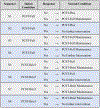Behavioral cancer pain intervention dosing: results of a Sequential Multiple Assignment Randomized Trial
- PMID: 37079854
- PMCID: PMC10733867
- DOI: 10.1097/j.pain.0000000000002915
Behavioral cancer pain intervention dosing: results of a Sequential Multiple Assignment Randomized Trial
Abstract
Behavioral pain management interventions are efficacious for reducing pain in patients with cancer. However, optimal dosing of behavioral pain interventions for pain reduction is unknown, and this hinders routine clinical use. A Sequential Multiple Assignment Randomized Trial (SMART) was used to evaluate whether varying doses of Pain Coping Skills Training (PCST) and response-based dose adaptation can improve pain management in women with breast cancer. Participants (N = 327) had stage I-IIIC breast cancer and a worst pain score of > 5/10. Pain severity (a priori primary outcome) was assessed before initial randomization (1:1 allocation) to PCST-Full (5 sessions) or PCST-Brief (1 session) and 5 to 8 weeks later. Responders ( > 30% pain reduction) were rerandomized to a maintenance dose or no dose and nonresponders (<30% pain reduction) to an increased or maintenance dose. Pain severity was assessed again 5 to 8 weeks later (assessment 3) and 6 months later (assessment 4). As hypothesized, PCST-Full resulted in greater mean percent pain reduction than PCST-Brief (M [SD] = -28.5% [39.6%] vs M [SD]= -14.8% [71.8%]; P = 0.041). At assessment 3 after second dosing, all intervention sequences evidenced pain reduction from assessment 1 with no differences between sequences. At assessment 4, all sequences evidenced pain reduction from assessment 1 with differences between sequences ( P = 0.027). Participants initially receiving PCST-Full had greater pain reduction at assessment 4 ( P = 0.056). Varying PCST doses led to pain reduction over time. Intervention sequences demonstrating the most durable decreases in pain reduction included PCST-Full. Pain Coping Skills Training with intervention adjustment based on response can produce sustainable pain reduction.
Copyright © 2023 International Association for the Study of Pain.
Conflict of interest statement
Figures


Comment in
-
Commentary on Somers et al. Behavioral cancer pain intervention dosing: results of a sequential multiple assignment randomized trial.Pain. 2023 Sep 1;164(9):1889-1890. doi: 10.1097/j.pain.0000000000002916. Epub 2013 Apr 27. Pain. 2023. PMID: 37595109 No abstract available.
References
-
- Bennell KL, Ahamed Y, Jull G, Bryant C, Hunt MA, Forbes AB, Kasza J, Akram M, Metcalf B, Harris A, Egerton T, Kenardy JA, Nicholas MK, Keefe FJ. Physical therapist-delivered pain coping skills training and exercise for knee osteoarthritis: Randomized controlled trial. Arthritis Care Res 2016;68:590–602. - PubMed
-
- Bennell KL, Nelligan R, Dobson F, Rini C, Keefe F, Kasza J, French S, Bryant C, Dalwood A, Abbott JH, Hinman RS. Effectiveness of an internet-delivered exercise and pain-coping skills training intervention for persons with chronic knee pain: A randomized trial. Ann Intern Med 2017;166:453–462. - PubMed
-
- Breast Cancer Staging System. AJCC Cancer Staging Manual 2017.
-
- Cleeland CS, Ryan KM. Pain assessment: Global use of the brief pain inventory. Ann Acad Med Singapore 1994;23:129–138. - PubMed
Publication types
MeSH terms
Grants and funding
LinkOut - more resources
Full Text Sources
Medical
Research Materials

